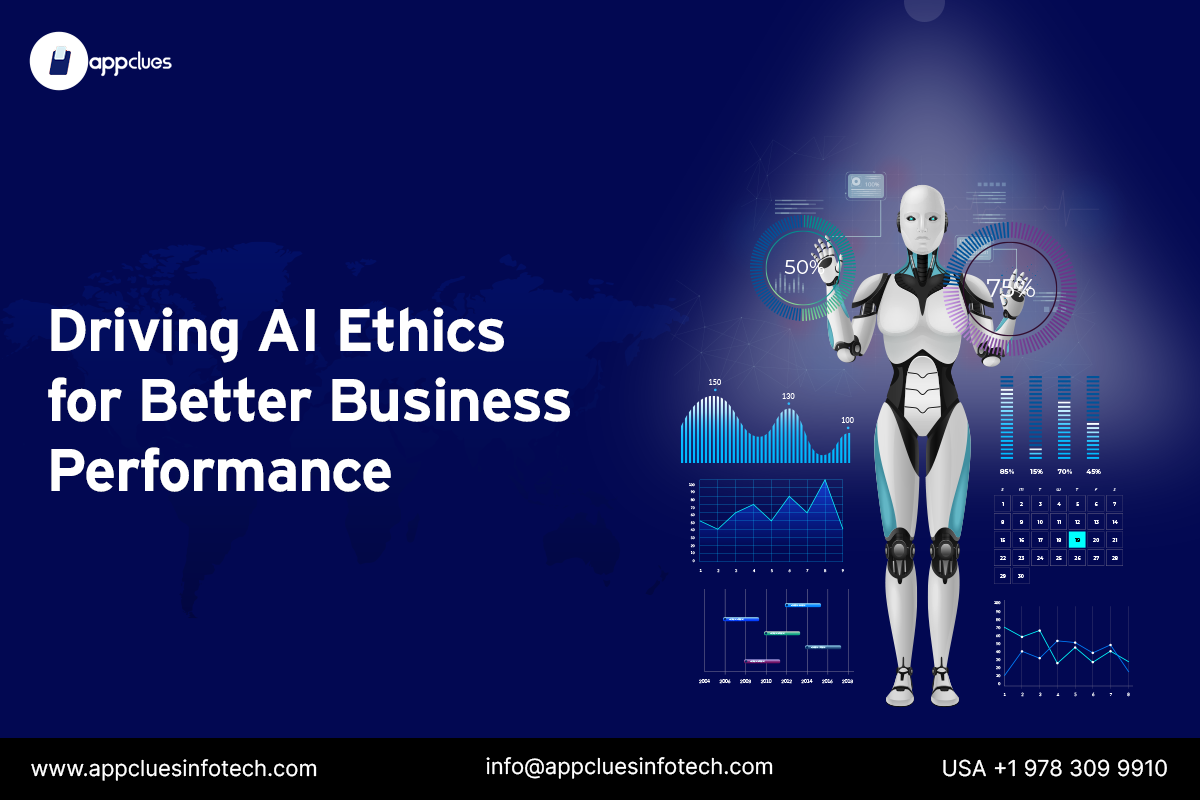Artificial intelligence is the buzzword for technocrats. Internet users are continuously receiving new information about AI algorithms being used for various purposes – from education and healthcare to retail and manufacturing. But AI’s potential for business doesn’t stop there. It will continue to grow in the coming years, bringing with it a host of benefits that can be leveraged by businesses of all sizes. From streamlining operations to increasing profitability, AI offers a variety of ways to make your company more efficient, cost-effective, and profitable. As technology is progressing, more and more organizations are using AI Development Services to automate internal processes and improve business intelligence.
Let us start our discussion by first understanding what AI is.
What is Artificial Intelligence?
Artificial intelligence (AI) is a technology that is capable of replicating human cognition and behavior to solve problems, make decisions, and complete tasks. AI is where machines are programmed to simulate human intelligence and then build on that capacity by learning, reasoning, problem-solving, and understanding language. In terms of business, AI is a technology that makes it possible for businesses to expand their reach without having to hire more employees. It’s an adaptive tool that can automate a wide range of manual processes, making work more efficient and effective.
Why Is AI Important for Business?
As many as 45% of CEOs say that their biggest challenge was to integrate digital technologies such as AI into their company. With more than 18,000 job openings for AI specialists, the demand for AI experts is high and growing. AI makes it easier to automate time-consuming tasks, freeing up employees to focus on more important jobs like improving customer experience or identifying new opportunities in a data set. Companies should consider whether they have the expertise needed to develop an AI system that operates ethically and has the capability of evolving. A possible option to implement an AI project within your company is to outsource it to an Artificial Intelligence Development Company.
As we learn more about how to create ethical AI systems, organizations can use those lessons as they update and upgrade their systems. Driving AI ethics requires a commitment not just from IT but also from all business functions including operations, product development, marketing, and customer service. For example, if a company builds an AI system that relies on customer sentiment analysis and sentiment analysis algorithms are unable to distinguish sarcasm from sincerity, this would be a design flaw with ethical implications that could lead customers to have a bad experience with the company’s product or service.
AI in Business: Opportunities and Use Cases
AI can be applied to nearly every aspect of a business, including customer service and sales. The most common use cases for AI in the enterprise include:
- Customer service: Customer service is a great place to implement AI. Whether you are a B2B or a B2C company, you can use AI to answer frequently asked questions, solve issues and complaints, and route calls to the appropriate human agent when necessary. You can use AI for sentiment analysis, speech recognition, and natural language processing, among others.
- Sales: Sales are another critical area where AI can be implemented. It is revolutionizing the sales process by helping humans bring in more business from cold leads.
- Marketing: AI can be used for predictive analytics and lead scoring, email and digital campaign automation, and website personalization.
- Human Resources: The HR field is using machine learning to help predict which candidates will succeed at their jobs.
- Risk management: AI can be used to detect anomalies and predict risk. You can use AI for fraud detection, risk assessment, and blockchain analysis.
- Security: You can use AI to detect and prevent cyber-attacks, detect vulnerabilities, and optimize the security of your systems.
- Operations: Using AI can drive efficiency and accuracy during the manufacturing process.
You have to hire AI developers or AI development service provider who has the same vision and passion as you, and then nothing else can stop you from creating groundbreaking AI solutions.
Types of AI in Business
There are many types of AI in business. Some examples include chatbot and voice assistants, natural language processing (NLP), computer vision, machine learning, and augmented reality. These different AI implementations have their benefits and challenges.
- Chatbots and voice assistants are good for quick customer service issues or basic information requests, but they lack emotional intelligence or the ability to have a back-and-forth conversation with a customer.
- NLP is good for large volumes of data because it can make sense out of unstructured text to identify patterns and provide insights about customers.
- Machine learning excels at decision-making where there are many possible outcomes with no obvious answer; however, some people may not trust this type of decision-making due to potential bias on the part of the programmer.
- Computer vision can generate insights from images that help businesses understand their markets better; this technology is also great for analyzing physical space to better understand how customers interact with products or services in stores.
- Finally, augmented reality provides businesses with fantastic new ways to interact with customers in real-time by integrating visuals into their regular day-to-day operations as well as providing consumers with a unique shopping experience.
AI Ethics for Better Business Performance
While it’s true that we need to guard against malicious uses of AI, we shouldn’t let those fears prevent us from exploring its potential for good. Organizations can drive AI ethics by implementing the following below-mentioned principles in their day-to-day operations and processes.
● Build in transparency.
Build transparency into your AI process from the get-go. Find ways to demonstrate how decisions are made and the data that’s used to make them. Transparency is important for ethical decision-making because it ensures that people can better understand how decisions were made, which prevents bias.
● Ensure user control and consent.
Organizations should give users control over their data and consent to use it. This includes the ability to opt out of any apps, websites, or other services that collect data about them.
● Establish criteria for human intervention.
If an AI system is given a task that falls outside its programming capabilities, it might need to decide how to behave. If we don’t establish criteria for human intervention in such situations, then AI is likely to act unpredictably.
For example, if an autonomous car needs to decide whether to break when encountering a pedestrian or not, the car should prioritize avoiding injury to the pedestrian. If this rule isn’t established in advance, then the car might drive through the pedestrian to protect its passenger.
● Develop a safety net to protect against unintended consequences.
Ensuring that AI always operates within legal and ethical bounds will help protect against unintended consequences. Organizations can use a safety net to guard against negative outcomes by including a clause in their contracts or interface agreements that explicitly state that AI will abide by all laws and regulations.
● Minimize negative consequences.
A company should implement measures and policies to avoid negative consequences.
For example, a company could design its technology’s algorithm in such a way that it discriminates against a specific type of person or group and minimizes any potential harm this might create.
● Maximize benefits.
A company should implement measures and policies to maximize benefits while ensuring everyone involved has access to these benefits.
For example, an organization could make sure their technology generates useful insights for different types of people or groups and keeps in mind that these groups need equal access to these insights.
● Be accountable.
A company should implement measures and policies that require accountability for all aspects of the technology’s operation to handle any problems when they arise.
For example, an organization should be prepared for unanticipated biases within their data by creating strategies for detecting those biases early on in the process and taking corrective action when necessary. They could also invest resources in supporting marginalized communities so that those communities have access to opportunities created by new technologies like AI.
● Avoid unintended consequences.
A company should avoid unintended consequences by paying attention to possible scenarios where there is a high probability
Why choose AI Solution Development Company?
Choosing the right kind of Artificial Intelligence Development Company is very important if you want the proper AI development solution for your problems. So, the company needs to have the following skills for your AI development.
- Knowledge of Data Science
- Expertise in machine learning and deep learning.
- Knowledge of Python, R, and Java.
You should hire a skilled AI App developer that can assist you at every step from ideation to deployment. They must be experienced in implementing embedded voice assistance, Chatbots, Integrating the best app monitoring and analytic tools & other latest technology-related features.
Summing Up
When it comes to AI, most of the ethical concerns are not about building ethical AI systems. Instead, they focus on the risks that unethical humans can pose to a system. To ensure AI systems operate ethically, organizations must embed AI ethics into their business processes from the get-go by implementing principles mentioned in the blog.



